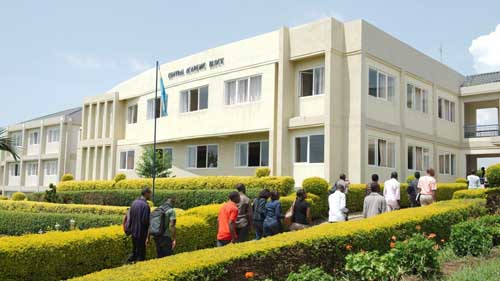
BY CLAUDE RICHLI
How can the people of Rwanda, who have faced unfathomable
losses, move forward and rebuild their lives? There is no other way than to learn
to forgive and turn the page. Of course, those who have to do most of the
forgiving are the Tutsis, but there are also countless moderate Hutu families
that were decimated simply because they refused to yield to the murderous
agenda of an extremist government.
Before forgiveness can happen, however, justice must take
place.

The international community set up a special court in
Arusha, Tanzania, to judge the leaders of the genocide. This judicial process,
however, is only the tip of a far greater and wider process called
gacaca (pronounced ga-tcha-tcha) that
took place in the country itself, Paul Rusesabagina, in his excellent
autobiography
An Ordinary Man,1explains that gacaca has deep
cultural roots. It means, loosely translated, “justice on the grass.” This
popular justice has played an important role from times immemorial as the
traditional local court system. Rusesabagina explains that “if somebody had a
problem with a neighbor he would not seek revenge. He instead brought it to the
attention of a group of men who we called elders. . . . The elders would invite
the village to come sit under the shade of a tree and hear the opposing sides
tell their stories. . . . After the two enemies had finished speaking, the
elders would give their opinions, one by one, on what should be done to remedy
the problem. . . . Confession was always the key. The village put a high value
on the act of admitting culpability, even if you were the one bringing the
case. It was viewed as a necessary step in the process of absolution. A man who
lied before the entire village knew that he would have to wear that lie for
years to come. There was an enormous incentive to come clean, and very little
penalty was meted out for being honest with the public, and with yourself. Then
came the most important part of the justice on the grass: the two aggrieved men
were required to share a gourd of banana beer as a sign of renewed friendship.
There were usually no lasting scars because it was hard to stay angry at
someone who had humbled himself before you. . . . Whether you were the victim
or the aggressor you had to strip yourself of pride and recognize the basic
humanity of the fellow with whom you were now sharing a banana beer. Everyone
who showed up to hear the case was invited to sip the banana beer too, as a
symbol of the accused man’s reconciliation with the entire people. It was like
a secular communion.”
2
The key to understanding gacaca
is to recognize that instead of being an adversarial justice system that seeks
retribution, it is actually a system of restorative justice that seeks
reintegration. This tradition was adapted to address the huge need for justice
after the genocide. According to Hesron Byilingiro, president of the
Seventh-day Adventist Church in Rwanda, the western system of justice would
have put hundreds of thousands of people in prison for the rest of their lives,
a situation that would have been impossible to administer. He says that
gacaca tries to minimize the
consequences by getting people to admit their guilt, pay compensation, and be
monitored for good attitude. The process has its flaws, of course.
3 In particular, the lack of professional training and, in some cases, the
involvement of the local elders (judges) themselves in the genocide have compromised
the impartiality that the law demands. However, this culture and the
implementation of the
gacaca by the
government beginning in the early 2000s explain how the country could move forward.
In some cases, though, only the love of Christ enables victims to turn the page
and start a new life. Sister Adèle Sefuku is an inspiring example of that
spirit at work.
Sister Sefuku’s home was invaded one night by a group of
young people baying for blood. Her husband, a Seventh-day Adventist pastor, was
murdered in front of her, and she and her daughter were left for dead after
having been savagely assaulted with machetes. Fortunately, both she and her
daughter survived the ordeal, although both their faces were deeply scarred. As
life eventually took its course, Sister Sefuku felt increasingly compelled to
minister to the thousands of people who now sit in prison convicted of murder.
One day, after she made an appeal for repentance to a group of prisoners, a
young man in the audience got up and said: “You don’t know me, but I am the one
who murdered your husband on that fateful evening. I am now asking for your
forgiveness.”
Our sister was deeply moved, and in the spirit of Christ she
decided not only to forgive him, but to see to it that he got a new life. She
went to the prison authorities to appeal to them to release the young man. She promised
to help him be reintegrated into the community by taking him under her own roof
and supporting him as best she could. Today, he is married man and a
transformed individual.
To her neighbors and friends who questioned her sanity,
Sister Sefuku’s answered: “I know what I am doing. Christ has forgiven me for
my sins; how can I not do the same! This boy took the life of my husband; God
now gave me the life of this boy to be as my own son.”
4